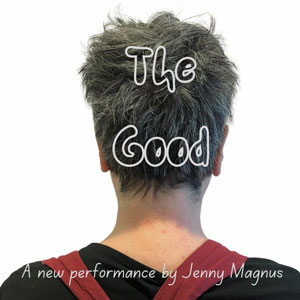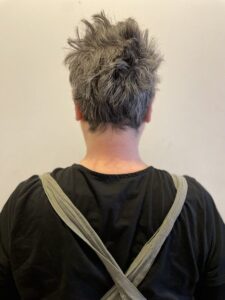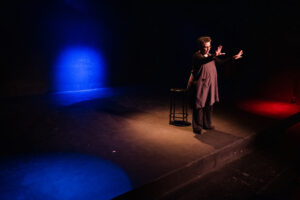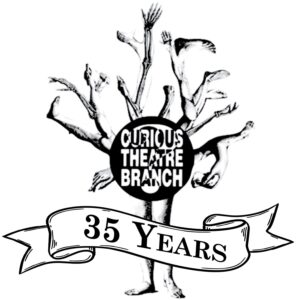
 ** Inventive but scattered, “The Good” presented by Curious Theatre Branch at Chicago Dramatists, stars Jenny Magnus in a solo performance. Magnus takes on the subject of “the good” and states that for the past 30 years, she has pondered what it means. Does it have to do with virtue or not being bad… or something else? Creating an entertaining 50-minute monologue about “the good” is a tall order from the get-go, considering that Magnus doesn’t want it to sound like a college lecture or a sermon from the pulpit or a Sermon on the Mount. The main message I got is that she would like to be a good person and that bullshit (her word) gets in the way of “the good.”
** Inventive but scattered, “The Good” presented by Curious Theatre Branch at Chicago Dramatists, stars Jenny Magnus in a solo performance. Magnus takes on the subject of “the good” and states that for the past 30 years, she has pondered what it means. Does it have to do with virtue or not being bad… or something else? Creating an entertaining 50-minute monologue about “the good” is a tall order from the get-go, considering that Magnus doesn’t want it to sound like a college lecture or a sermon from the pulpit or a Sermon on the Mount. The main message I got is that she would like to be a good person and that bullshit (her word) gets in the way of “the good.”
Magnus has a pleasing delivery. She holds our attention without sounding preachy. The entertainer is at her best when moving about the stage while dancing and singing and even while getting her coat at the end. There are moments when portions of her monologue might have worked better at a comedy club than at a theatre, considering its spots of humor. In fact, I think it would have been better had she turned her monologue completely into a comedy routine. She could have made the word “bullshit” funny like the legendary George Carlin. Had she more clearly connected “the good” with her dislike of bullshit, it would have made a huge impact on the audience and would have been an improvement over delivering a mostly philosophical rant.
The best part of the performance has to do with the original songs that she has created, but not all of them fall into observations of goodness except if you stretch the definition. Some lyrics don’t express what “the good” may be but actually point to a comparison with those things that are not. Although some thread about “the good” ties many (but not all) of the songs together, it got me thinking about a series of short stories where the title on the cover might be the first short story of the set or the one that’s the most popular or stirring. The title thus doesn’t necessarily describe the entire contents of the book.
Some of the most interesting components of the show have to do with the projection design of original black and white movies. These recently created films are reminiscent of the age of silent motion pictures. We initially see hands being held and released and a bed being made. Then we see people from Chicago Dramatists’ putting on aprons. I wasn’t sure what the significance of the movies were or the various aprons and how all this tied into an examination of “the good.” But it was interesting to see how Magnus struggled less with putting on her apron as compared to most of the individuals being projected behind her. I liked the immediacy of the humor, especially when the actors danced on screen as Magnus danced on stage. Their combined body language is great, and this part is fun. Sound looping allows Magnus to sing with herself a number of times during the course of the performance, so that she presents herself as both the vocal soloist and the background singer. Note that members of the creative team include Stefan Brün (director), Jeffrey Bivens (video), Mariana May Carlson (stage management), Ralph Loza (music mixing and mastering, sound consultant), and Meghann Wilkinson (movement consultant).
It’s not accidental that Magnus devotes so much time and thought to the red versus the blue. But by homogenizing everything and intentionally staying away from politics, her message becomes too drab. Things could have been made sharper and more poignant throughout without becoming political. Yet the bigger problem with the show is this: When Magnus’s use of the word “good” takes on too many different meanings and nuances, her discussion becomes much too disjointed. We get bombarded with too many ideas at once; such that when the audience focuses on one set of observations, most of the others race by. While the majority of these observations are good, interesting, and valid, the audience isn’t given enough time and space to digest all of them or to dwell on them. Because all of us were working so hard to remember her clever lines, figure out her arguments, and compare these with our own thoughts, the result is that so much of what she says becomes forgotten. Thus, I found myself getting lost in the maze of streets, alleys, and blind alleys about “the good” and “the not-so-good” versus “the bad” and “the not-so-bad.” While this adventure provided some fertile ground for me to think my own thoughts and make my own mental leaps, it was certainly not a good thing when I began to lose focus.
Magnus has undertaken a humungous task, seeking answers to questions which philosophers and scholars of religion have been wrestling with for thousands of years. In keeping with her mostly serious approach to the subject matter, she should have realized that “the good” is not just a matter of how close we might get to goodness or how far we might stray from it. To my mind, references to evil and malice should have been included as likely opposites to goodness. Here I’m not talking about fire and brimstone or heaven and hell or even religion and morality. Rather, her secular discussion should have referred to ethics as one means of counteracting the bullshit which she decries.
Even though the average college professor or preacher could not have pulled off as amusing a presentation as this one, the show left me empty and unfulfilled. I found myself with just as many questions as I started out with, perhaps more. My idea of “the good” unfortunately became so homogenized after watching this presentation that I no longer had an idea of the boundary where “the good” ended and “the bad” (or evil) began. I guess I was looking for something I could hold onto at the end of the evening: like a pithy saying or perhaps an emotion. Was the show good? At least, it helped to start a conversation with my guest afterwards. Maybe this was a good thing after all.
“The Good” is playing through April 21, 2024, at Chicago Dramatists, 798 N. Aberdeen, in Chicago.
Tickets are priced on a “pay what you can” scale, with a suggested price of $20.

Performance schedule:
Fridays and Saturdays – 8:00 p.m.
Sundays, April 7 and 14 – 3:00 p.m.
For more information and to purchase tickets, go to https://curioustheatrebranch.com/onstage/goodness.
For general information and to learn more about their other offerings, see: https://curioustheatrebranch.com/.
To see what others are saying, visit www.theatreinchicago.com, go to Review Round-Up and click at “The Good”.






More Stories
“The Firebugs” reviewed by Julia W. Rath
“The Book of Grace” Al Bresloff with another from Paul LIsnek
“The Last Five Years” MILWAUKEE